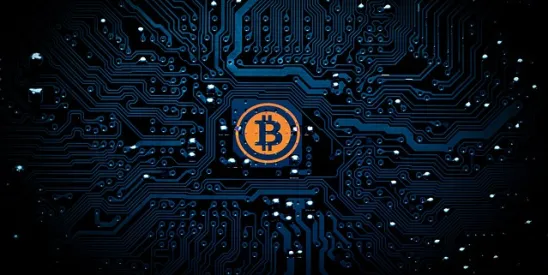No blockchain phenomenon has garnered more attention lately than Initial Coin Offerings ("ICOs"), which have exploded in value and raised more than $1.2 billion thus far this year.
In a typical ICO, a blockchain-based product or service provider offers proprietary digital assets ("tokens") – rather than traditional forms of debt or equity – in exchange for working capital, usually provided in the form of a cryptocurrency such as Bitcoin or Ether ("ETH").
One of the first truly significant ICOs was carried out by a platform called The DAO, an attempt by an entity known as Slock.it to build a "decentralized autonomous organization."[1] Over the span of about a month in May 2016, The DAO's ICO raised about 12 million ETH — the equivalent of approximately $150 million.
The SEC's Report on The DAO
On Tuesday, the Securities and Exchange Commission released a report of investigation regarding potential federal securities law violations involving The DAO and related entities. Although it determined not to pursue enforcement action, its report stated that the digital tokens issued by The DAO in its ICO qualify as securities under the Securities Act of 1933 and the Securities Exchange Act of 1934. The SEC found that the DAO Tokens are securities because they constitute an "investment contract" under the federal securities laws.
The Howey Test
Whether an investment contract exists must be resolved on a case-by-case basis in accordance with the economic realities of the given transaction. While there is no bright line, for more than 75 years this analysis has proceeded under a multi-factor test first laid out by the Supreme Court in SEC v. W.J. Howey Co.
Under the Howey test, an investment contract is defined as: (i) an investment of money (ii) in a common enterprise with (iii) a reasonable expectation of profits to be derived from the entrepreneurial or managerial efforts of others. To find an investment contract exists, all three prongs must be satisfied.
The SEC's report applies this test to the underlying characteristics of The DAO organization and its DAO Token offering.
Looking at the first prong, the SEC concluded the ICO involved an investment of money. This was based on the principle, well-established in case law, that for purposes of Howey "money" need not actually be money— an investment may take the form of goods and services or some other exchange of value. Thus, the securities laws may still apply despite the fact investors purchased the tokens using ETH rather than cash.
Next, the SEC concluded that investors in DAO Tokens were invested in a common enterprise because the ETH was pooled and available to The DAO to fund projects.
Third, the SEC explained that the requisite expectation of profits was present because the token holders bought into The DAO with the intention that those projects would make money, causing their capital to appreciate.[2]
Finally, the SEC concluded under the Howey test that the profits were dependent on the essential entrepreneurial and managerial efforts of The DAO's creators and Curators. The DAO's creators developed and maintained the technological platform, facilitated communications between its users, and promoted it to the public. The Curators, meanwhile, had the unilateral ability to select projects that would be put to vote for approval. The SEC found that the voting power of the DAO Token holders was comparatively limited, compared to the Curators. On net, this led the SEC to find the final prong of the Howey test satisfied.
Result: The DAO Tokens are Securities
As securities, the tokens must be registered with the SEC or qualify for an exemption in order to be offered or sold within the United States. Further, any exchange platform that facilitates initial or secondary market transactions in tokenized securities such as DAO Tokens must likewise register as a national securities exchange or operate pursuant to an exemption.
Notably, the SEC has stated it will not be pursuing enforcement actions against those responsible for The DAO's ICO at this time. This does not foreclose the possibility of liability under Section 12(a)(1), a private right of action that provides recessionary damages on a strict liability basis for those that purchased their tokens directly from the issuer of an unregistered public offering.
Takeaways
The DAO, which until now was best known for having around $50 million of investor funds stolen by hackers exploiting weaknesses in the platform' s smart contracts, is no longer operational. The real import of the SEC's report of investigation is what it means for crypto-exchanges, other actual and would-be ICO issuers, and the token marketplace as a whole.
For blockchain developers thinking of doing an ICO, a range of approaches remain available. The first is to register the tokens with the SEC and issue them in a public offering. This is unlikely to appeal to those who seek the flexibility and ease of an ICO.
Another more nuanced option is to craft the features of the token, and the network on which it operates, so as not to implicate the securities laws. For example, by coupling the capabilities of distributed ledger and smart contract technology, tokens might be designed that are valuable primarily for their use-value.[3] One example of this may be a token such as ETH itself, which is designed to be consumed as virtual fuel for when applications run on the Ethereum blockchain network. Building functional tokens is something that many developers are already doing, or claiming to do. Either way, it would be wise to proceed with caution. Tokens may be securities — and the SEC is watching.
Alternatively, public securities ICOs may still be conducted outside the United States as long as no offers or sales are made to U.S. investors. Or an offeror can do an ICO as a private placement within the country as long as it only sells to a limited number of investors who are not "accredited investors."
The SEC's Report did not state whether The DAO was an "investment company" under the Investment Company Act, but in a footnote the SEC warned that ICO issuers should consider potential Investment Company Act obligations as well. Although not addressed by the report, one of its implications is that a pooled investment vehicle investing in DAO tokens (because the tokens may be securities) would also need to consider the applicability of the Investment Company Act.
As for the ICO marketplace more generally, it is likely the SEC's involvement will cause some initial chilling effects – especially as a result of requiring exchanges to register as securities exchanges (and comply with the associated requirements). On the other hand, this may ultimately mark a turning point for ICOs and other blockchain-based mechanisms of alternative fundraising. Added legitimacy and more reliable offerings would both benefit existing market participants and attract more mainstream, risk-averse investors into the fray.
[1] Using smart contracts and code built on the Ethereum blockchain, The DAO promised to automate organizational governance and decision-making in the pooling and allocation of capital to promising projects, as well as in the distribution or re-allocation of profits. Members of The DAO held voting power in these decisions proportional to the number of DAO Tokens they owned. Highly skilled individuals selected by Slock.it to act as "Curators" worked outside the decentralized system to vet proposed projects and determine whether and in what order they would be put up for vote.
[2] This investment value is distinguishable from use value. For example, one may have an expectation of profit in buying a house but the house is valuable independent of the fact that its value is expected to rise over time on the market.
[3] Another example, interesting in the context of the SEC's report, would be to design a decentralized autonomous organization that is more decentralized and more autonomous than The DAO. The SEC's analysis on the "efforts of others" prong was focused on non-decentralized activities.







 />i
/>i

